|
|
|
Sort Order |
|
|
|
Items / Page
|
|
|
|
|
|
|
| Srl | Item |
| 1 |
ID:
164285
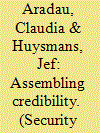

|
|
|
|
|
| Summary/Abstract |
Critical approaches in security studies have been increasingly turning to methods and standards internal to knowledge practice to validate their knowledge claims. This quest for scientific standards now also operates against the background of debates on ‘post-truth’, which raise pressing and perplexing questions for critical lines of thought. We propose a different approach by conceptualizing validity as practices of assembling credibility in which the transversal formation and circulation of credits and credentials combine with disputes over credence and credulity. This conceptualization of the validity of (critical) security knowledge shifts the focus from epistemic and methodological standards to transepistemic practices and relations. It allows us to mediate validity critically as a sociopolitical rather than strictly scientific accomplishment. Developing such an understanding of validity makes it possible for critical security studies and international relations to displace epistemic disputes about ‘post-truth’ with transversal practices of knowledge creation, circulation and accreditation.
|
|
|
|
|
|
|
|
|
|
|
|
|
|
|
|
| 2 |
ID:
164283
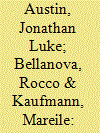

|
|
|
|
|
| Summary/Abstract |
What does it mean to study security from a critical perspective? This question continues to haunt critical security studies. Conversations about normative stances, political engagement, and the role of critique are mainstays of the discipline. This article argues that these conversations tend to revolve around a too disembodied image of research, where the everyday practice of researchers is sidelined. But researchers do do research: they work materially, socially, and cognitively. They mediate between various feedback loops or fields of critique. In doing so, they actively build and exercise critique. Recognizing that fact, this article resists growing suggestions to abandon critique by, first, returning to the practice of critique through the notion of companionship. This permits us to reinvigorate our attention to the objects, persons, and phenomena through which critique gains inspiration and purpose, and that literally accompany our relationship to critique. Second, we explore what happens when our companions disagree, when critique faces controversies and (a) symmetries. Here, we support research designs of tracing credibility and establishing symmetries in order to move away from critique as denouncing positions we disagree with. Third, we discuss the relation between companionship, critique, reflexivity, and style. Here, the rhetorical practices of critical inquiry are laid out, and possibilities for its articulation in different and less silencing voices are proposed.
|
|
|
|
|
|
|
|
|
|
|
|
|
|
|
|
| 3 |
ID:
164287
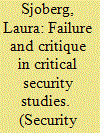

|
|
|
|
|
| Summary/Abstract |
Debates imitates scholarship, which imitates debate. Using perspectives from both my policy debate career and my research career, this article argues that the enterprise of critique, whether in critical security studies or elsewhere, is always and already failing and failed. It proceeds in four sections. The first section sets up my entry into the problems of/with critique. The second section analyzes the types of dissonances inherent in the production of critical security studies scholarship. The third section theorizes those dissonances as failures – arguing that failure itself is a part of in and of critical security studies. The conclusion discusses where to go from, during, and in a world of failed critique in critical security studies.
|
|
|
|
|
|
|
|
|
|
|
|
|
|
|
|
| 4 |
ID:
164288
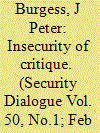

|
|
|
|
|
| Summary/Abstract |
‘Security’ is a uniquely rich object for critique. It rests on a long and noble conceptual history in Western thought. And yet the provision of security most often consists of a shoring up, through the discourses of nationality, ethnicity, political economy or even science, of what is assumed to be solid at its core but weakened through the contingencies of politics, society, ideology, and so on. The article argues that the critical force of critique stems from the fact that critique itself is a practice inescapably bound up with insecurity, and thus that the critique of security exercised since around 1997 as ‘critical security studies’ is self-replicating. By introducing concepts from Husserlian phenomenology, it attempts to show that insecurity is not a simple feature of an otherwise secure state of life, ripe for critical analysis that promises to expose its false premises. Rather, insecurity lies at the very foundation of critical thought. Building upon the bare and basic question, ‘What does it mean to mean?’, a phenomenology of security asks the straightforward question: ‘What is the security-ness of security?’ It permits one to ask what remains of security when all else is stripped away, what essential minimum must be retained in order for security to be security.
|
|
|
|
|
|
|
|
|
|
|
|
|
|
|
|
| 5 |
ID:
164284
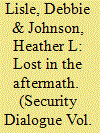

|
|
|
|
|
| Summary/Abstract |
What happens when violence disappears? What is left in the backwash of crisis? Who attends to the emotional, material and ideational detritus of closing borders? Like many, we are working in the aftermath of the recent and deadly intensification of EU migration. We contest the widespread account that the ‘crisis’ is now over – that policymakers have effectively ‘solved’ the problem of migration by gathering undocumented subjects into infrastructures of containment. We focus instead on the painful traces of EU migration that continue to be produced by global structures of citizen/alien, legal/illegal, friend/enemy. We do not produce a comprehensive diagnosis, normative argument or critical framework. Instead, we rest awhile in the aftermath of the crisis – specifically on the Greek island of Kos – to think about questions of abandonment, erasure and displacement. This is a visual essay representing a conversation between two researchers as they interact with the aftermath of the refugee crisis on Kos. Reflecting on select images from September 2016, we present a dialogue that directly speaks to a core theme each image raises. In doing so, we question some of the basic assumptions about how to do critical analysis on migration, security and borders, and therefore seek to disrupt dominant modes of academic writing as well as the practice of research itself.
|
|
|
|
|
|
|
|
|
|
|
|
|
|
|
|
| 6 |
ID:
164286
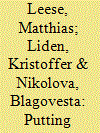

|
|
|
|
|
| Summary/Abstract |
In this article, we examine the possibility of exercising critique through the mandatory ethical coverage that EU security research projects must be subjected to. Applied ethics, so we argue, speaks to several core issues in the critical security studies agenda, such as turning abstract considerations of critique into forms of tangible cooperation, engaging exoteric communities, and placing normative questions about security within concrete contexts of its imagination and production. Accordingly, it can be seen as a concrete way of putting critique to work. At the same time, however, applied ethics does face considerable challenges that result from its location in the middle of numerous cross-pressures, such as political ambitions, economic interests, technological rationales and the demands of security professionals. These challenges risk turning what was intended to be the critical corrective of applied ethics into a legitimizing function of mere ‘ethics approval’. Drawing on personal experiences as well as debates on critical security studies and ethics, we discuss some of these challenges and discuss the possibility of and conditions for critique within the arena of EU security research.
|
|
|
|
|
|
|
|
|
|
|
|
|
|
|
|
|
|
|
|
|